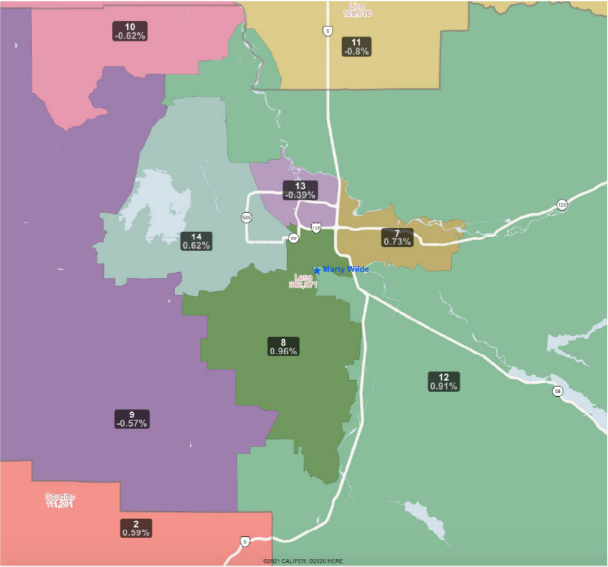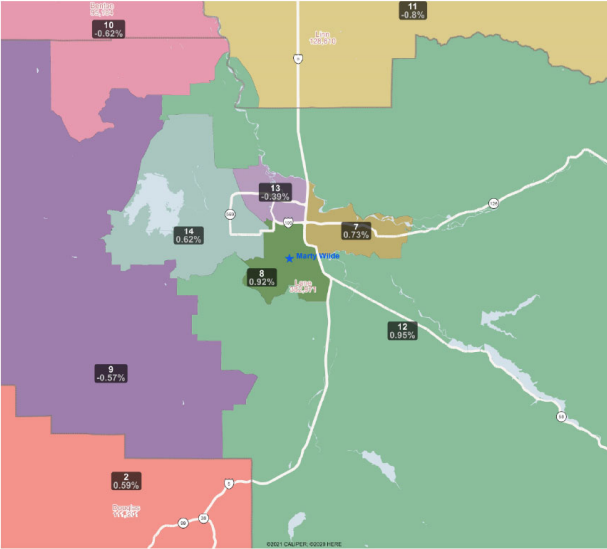Documents are flying fast when it comes to Oregon’s process for redrawing voter maps.
First the Oregon Legislature barely met its deadline to submit redistricting maps to Gov. Kate Brown. Then only days after, Oregon Republicans filed lawsuits over the newly drawn political maps. And now there’s a new legal challenge filed in the Oregon State Supreme Court, focused on two Oregon House districts.
On Oct. 25, two Lane County residents — David Calderwood and Gordon Culbertson — filed a lawsuit challenging whether the two redrawn Legislature House Districts where they live, districts 8 and 12, are constitutional. The lawsuit argues the Senate neglected constitutional requirements for a political jurisdiction and protected incumbent Sen. Floyd Prozanski from facing a Democratic primary challenger. Plaintiffs are asking the court to have the Office of the Secretary of State redraw the two districts.
State Rep. Marty Wilde, who was on military duty with the Oregon Air National Guard while the Legislature debated redistricting, filed a letter in support of the lawsuit. In the letter, he alleges facing retaliation from the Senate via the new maps and explains why his new district doesn’t meet constitutional muster.
In the early stages of the Legislature’s redistricting, Wilde spoke out and organized constituents to protest having the University of Oregon area be split into three different House and Senate political districts. “These efforts were ultimately successful,” he writes, because the Redistricting Committee kept the UO neighborhood in a single district in later maps.

But those maps put the precinct where Wilde resides into the geographically large district of HD 12. Wilde’s new House district stretches from his southeast Eugene neighborhood, goes south to Cottage Grove, east to Oakridge, then Blue River, around Marcola, west to Coburg, then Junction City, and finally and lastly to Cheshire.
Prozanski is located in Senate District 4, and so was Wilde until his precinct was moved to SD 6. SD 4 consists of south and west Eugene and Springfield. SD 6 is mostly rural Linn and Lane counties and east of the I-5.
In the Oct. 25 legal challenge, the plaintiffs argue that when the Oregon Legislature placed southeastern Eugene into a district alongside a majority rural area, it was only for the intent to reach a population balance target. This suggests the Senate didn’t consider the constitutional requirements of political and geographic boundaries, communities of interest and transportation links, the plaintiffs say.
In his letter of support, Wilde also mentions that members of the Senate Redistricting Committee told him that the population target was the reason for the shape of HD 12, and that they were inflexible on the changing map.
Wilde alleges in the letter that his home precinct was removed “with near-surgical precision.” Being placed into the new district was a decision made by Senate leadership, he writes, who knew he intended to run in the upcoming Senate primary election against Prozanski.
The lawsuit alleges the Senate moved Wilde’s home precinct to another legislative district to protect Prozanski from facing Wilde in a primary election.
The district that Wilde now resides in after redistricting isn’t consistent with the law regarding communities of interest, he and the legal challenge allege. The new district includes parts of south Eugene, as well as rural precincts to the north and west of Cottage Grove and Creswell. Wilde points to shopping, transportation and schools as key communities of interest affected by the redistricting.
Constituents who live in Wilde’s new district who live in Eugene do most of their shopping and commercial-related activities in the city, he says in the document. However, the rural constituents shop miles away from Eugene.
A legal political district also has to be connected via transportation links. In the Oct. 22 document, Wilde says the Eugene portion is connected through two major arteries — 30th and Amazon. However, this portion of Eugene isn’t connected to the rural districts, he adds.
The majority of the schools in Wilde’s new political district belong to Creswell and South Lane schools, he says. However, the south Eugene precinct belongs to 4J Eugene School District and is more of a community of interest with the other Eugene precincts, he says.
According to the lawsuit, HD 8 and 12 could be redrawn without affecting other districts. The plaintiffs offer a scenario where southeastern Eugene joins the rest of HD 8, uniting the city’s population south of Interstate 105. HD 12 would then incorporate the south Lane County areas that HD 8 had.

Wilde says in an Oct. 25 press release that the Legislature passed the redistricted maps while he was on military duty, so he couldn’t defend his constituents’ interests during the special legislative session.
“Legislators bear a special responsibility to follow the law,” he says in the Oct. 25 press release. “By passing a map that protects every single sitting senator from a primary challenge, while dividing communities of interest in my district in service of that goal, the Oregon Legislature failed to abide by the requirements of the law. I will never put the interests of any politician or party above those of my constituents. I trust the Oregon Supreme Court to defend my constituents and the rule of law.”
